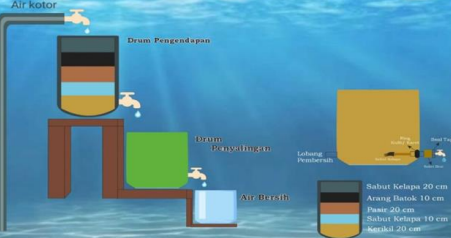Inovasi Penjernihan Air Sebagai Solusi Ketersediaan Air Bersih di Desa Pandan Sejahtera
DOI:
https://doi.org/10.22437/jpm.v4i1.22511Keywords:
Innovation, Filtration, Purification, Water, WasteAbstract
Pandan Sejahtera Village is one of the villages located in Geragai District, East Tanjung Jabung Regency, Jambi Province. The main livelihood and income of the people in Panda Sejahtera village comes from areca nut, oil palm and coconut plantations. The higher the productivity of areca and coconut plantations, the higher areca coir waste and coconut shell waste produced. The water sources in Pandan Sejahtera Village can be said to be not good, this is because many of the people of Pandan Sejahtera Village use drilled wells and ground wells as the main source of water. However, the well water produced is still unfit for use because it is dirty. There needs to be processing to obtain clean water and can be utilized, namely with water purification innovations. In this activity, the community service team provided socialization and counseling so that they could utilize areca coir and coconut shells as an innovation in water purification as a solution to the availability of clean water. This service activity is expected to be a solution to problems that exist in the community.
Downloads

Downloads
Published
How to Cite
Issue
Section
License
Copyright (c) 2023 Ria Hikmarina, Susnita Sari, Hasri Yanti, Rahmi

This work is licensed under a Creative Commons Attribution-NonCommercial-ShareAlike 4.0 International License.











